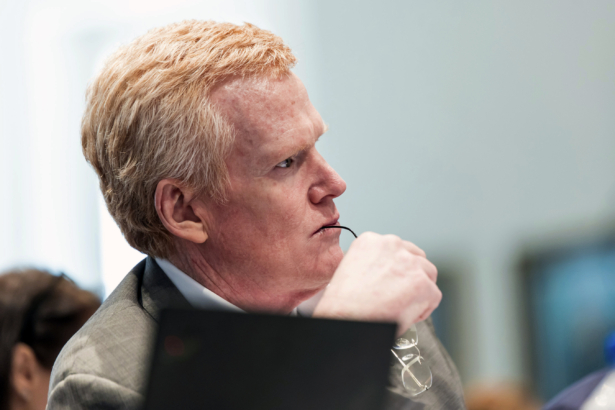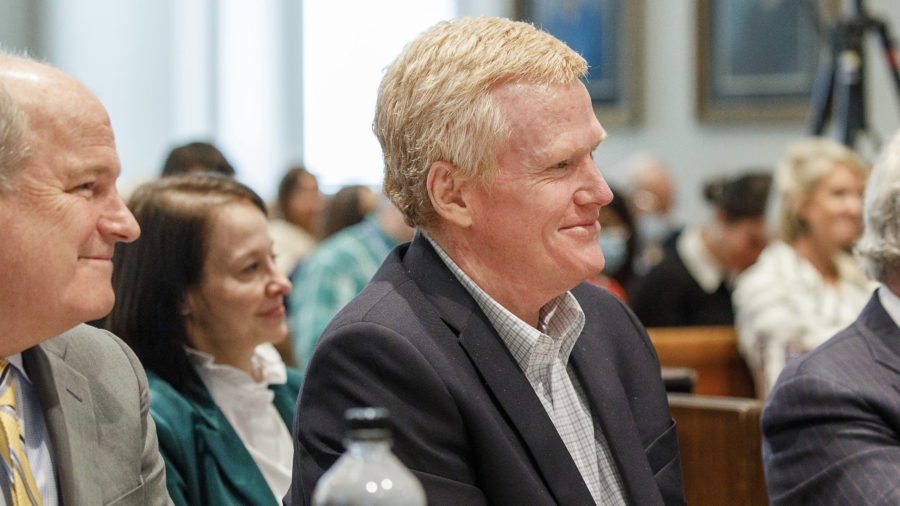In an interview two months after Alex Murdaugh’s wife and son were killed, investigators zeroed in on inconsistencies in what Murdaugh told authorities about their deaths, according to the videotaped discussion played Wednesday at the disgraced South Carolina attorney’s double murder trial.
The interview between the state’s chief investigator and Murdaugh backed up much of what the jury had heard about the case already in three weeks of testimony—Murdaugh said he wasn’t at the dog kennels near where his wife and son were killed when witnesses said they heard his voice there minutes before the killings. Murdaugh also changed clothes sometime in the hours before he found the bodies.
Murdaugh didn’t have immediate answers for the inconsistencies in the friendly interview with State Law Enforcement Division agent David Owen.
Court broke for lunch for prosecutors still questioning Owen, who was expected to be one of their final witnesses after three weeks of presenting their case.
The defense’s cross-examination is expected later Wednesday, with questions expected to focus on deficiencies in the investigation and evidence that was or was not collected.
Alex Murdaugh, 54, faces 30 years to life in prison if convicted of killing his 52-year-old wife, Maggie, and their 22-year-old son Paul. Their bodies were found June 7, 2021, near the kennels at their Colleton County home. Murdaugh has adamantly denied killing them.
Owen testified Wednesday as the lead investigator in the case, and the key part of his testimony so far was the taped interview Aug. 11, 2021. Murdaugh wanted an update on the case and agreed to answer any questions Owen had. He brought his friend and attorney Corey Fleming along.
Murdaugh started crying at the beginning of the video. The tears dried up as Owen brought up evidence Murdaugh at the time didn’t know existed—a Snapchat video posted by his son taken a few hours before the killing showing Murdaugh wearing different clothes than the shorts and T-shirt he had on when police arrived after he called 911.
“What point in that evening did you change clothes?” Owen asked.

“I’m not sure,” Murdaugh said, pausing for several moments. “What time of day was it?”
The interview went on for more than an hour. Owen pressed Murdaugh for details like what time his wife got to the property and how long the three ate dinner together. Murdaugh’s answers weren’t specific.
Owen revealed some details of the investigation. He said markings from ammunition casings near Maggie Murdaugh’s body matched other casings found at a shooting range on the property. The two barrels of the shotgun used to kill Paul Murdaugh had different-sized pellets, similar to the way other shotguns found on the family property were loaded.
Murdaugh’s lawyer, Corey Fleming, asked Owen for more details. Fleming was a longtime friend of Murdaugh and was charged seven months later with insurance fraud after authorities said he helped Murdaugh steal money from what was supposed to be a wrongful death settlement for the sons of the Murdaugh housekeeper, who died in a fall.
“The only DNA we have are family and close friends. We don’t have any fingerprints. Unfortunately, we don’t have any shoe wear or tire wear impression because it rained that night,” Owen said, “The only thing we can go off of are the cell tower dumps.”
Late in the interview, Owen offered to answer any of Murdaugh’s questions.
“Is this one person, two persons, three persons?” Murdaugh asked.
“We’ve got two guns; we’ve got two different kinds of ammunition. It is hard to say,” Owen answered.
Murdaugh asked if either his wife or son suffered or lived long after they were shot.
“A matter of seconds, if that,” Owen responded.
Later in the interview, Murdaugh asked Owen how far apart his wife and son were killed and how certain he was that Paul Murdaugh had been shot first. Owen said he based that idea on figuring Paul Murdaugh would have reacted if he saw or heard his mother being shot.
“Maggie would have known that then, wouldn’t she?” Alex Murdaugh said. “How soon after was she shot?”
Owen told Murdaugh not to beat himself up over those details.
Judge Clifton Newman announced at the beginning of court Wednesday that all the remaining jurors and alternates tested negative for COVID-19. On Monday, two jurors were dismissed after testing positive for the virus, and the clerk of court also has COVID-19, leading to worries that the virus has been spreading through the courtroom and could cause a delay or a mistrial.
By Jeffrey Collins

